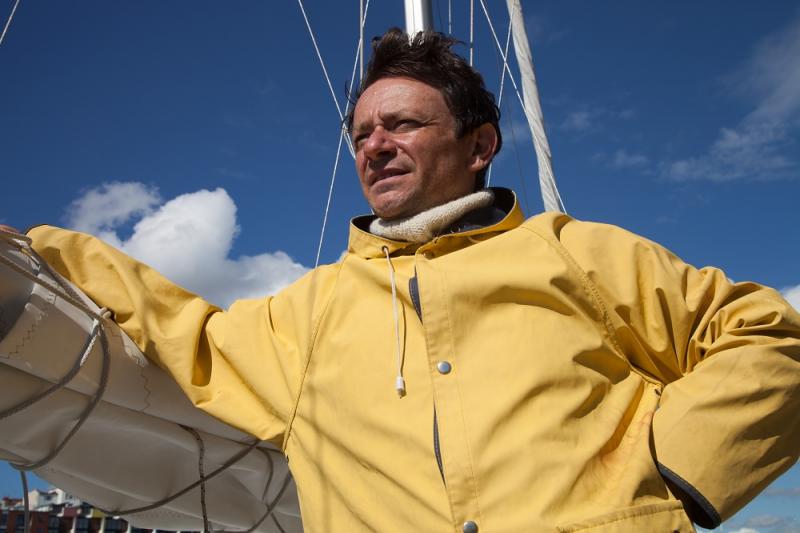Crowhurst review - plucky indie wins race with rival | reviews, news & interviews
Crowhurst review - plucky indie wins race with rival
Crowhurst review - plucky indie wins race with rival
The low-budget indie bests the recently released film about the same maritime disaster

Perhaps it’s fitting that Donald Crowhurst should once more find himself in a race. Even more aptly, it’s a race against himself. You wait half a century for a biopic about the round-the-world yachtsman who disappeared off the face of the earth, and then two turn up at once. This sort of clash sometimes happens in film, and one movie always ends up trouncing the other.
Last month The Mercy, directed by James Marsh and starring Colin Firth as Crowhurst, took a conventional approach to the story of a man who cracked up in the middle of the Atlantic and sent back fake news of his position. In a most unusual move, StudioCanal decided to acquire the distribution rights to its low-budget rival and, rather than attach weights to it and throw it overboard in the ocean, release it after The Mercy. Crowhurst, directed by Simon Rumley, written by Andy Briggs and starring Justin Salinger, is that film. Shot on a fraction of The Mercy’s budget, it has the vagabond attitude of the punky underling. The result is a much more jagged, nerve-shredding and visceral account of mental disintegration.
His journey into madness takes us into the realm of horror
That clarity of intention is overt in the opening scene. Crowhurst, on the radio phone to his agent, hears that he is in the lead and a vast crowd awaits his homecoming, when he can claim a prize for the fastest circumnavigation. Salinger’s face falls, then lights up: he doesn’t know whether to laugh or weep. The black joke, as we will discover, is that he hasn’t gone roung the world at all. He’s dawdled for months in the Atlantic. The crack-up starts here.
The lack of a budget has liberated Rumley to zero in on Crowhurst’s battle with crushing isolation. With no money to spend on the public story – the involvement of the Sunday Times, of Sir Francis Chichester and the cheering public – the film leaves Salinger on his own for much of the film, mostly holed up in the tiny cabin of the Teignmouth Electron, the trimaran in which the hopelessly inexperienced dreamer joined the race to circumnavigate the globe non-stop in 1968. When he first sets sail there’s a long audacious sequence in which silence reigns, the daily routine of solitary sailing is established, and he doesn’t speak at all. Only when something goes wrong – the cabin floods overnight – does he give way to ranting.
For anyone unfamiliar with the minutiae of Crowhurst’s story – of what went wrong and why, and precisely how he went about fabricating his coordinates to pull the wool over the eyes of everyone back home – this version may seem sketchy, although it includes some key facts which The Mercy omitted. For starters, the Crowhursts’ fourth child is restored (in the other film they had a less burdensome three children). More profoundly, the night before he sails Crowhurst weeps inconsolably in the arms of his wife Clare (Amy Loughton, pictured below with the children). Rumley adopts a choppy editing style which has a berserk efficiency. A scene in which Clare christens the boat only for the bottle not to break – a terrible omen – is done in five seconds. The catastrophic maiden voyage, and Crowhurst’s delusional interpretation of his and the boat’s performance, is also swiftly dispatched. Because he can’t talk to anyone directly he often addresses the camera instead. His wife, children, sleazy agent (Christopher Hale) and implacable backer (Glyn Dilley) all speak directly back. Sometimes they all scream, and often sing too, rancid patriotic tunes – "Land of Hope and Glory", "I Vow to Thee, My Country" and, climactically, all four verses of the national anthem. None offers any defence against disaster.
Rumley adopts a choppy editing style which has a berserk efficiency. A scene in which Clare christens the boat only for the bottle not to break – a terrible omen – is done in five seconds. The catastrophic maiden voyage, and Crowhurst’s delusional interpretation of his and the boat’s performance, is also swiftly dispatched. Because he can’t talk to anyone directly he often addresses the camera instead. His wife, children, sleazy agent (Christopher Hale) and implacable backer (Glyn Dilley) all speak directly back. Sometimes they all scream, and often sing too, rancid patriotic tunes – "Land of Hope and Glory", "I Vow to Thee, My Country" and, climactically, all four verses of the national anthem. None offers any defence against disaster.
This is a portrait of gathering psychosis. When a fish lands in the cabin and flaps frenetically until it expires, there’s no room for doubt that it foretells Crowhurst’s destiny. His dreams are invaded by more such fish. His journey into madness takes us into the realm of horror like something jagged from early Nicolas Roeg (this is no coincidence: Roeg is an executive producer). There is no redemption in this brutal, unsentimental telling of an Englishman lost at sea.
rating
Explore topics
Share this article
The future of Arts Journalism
You can stop theartsdesk.com closing!
We urgently need financing to survive. Our fundraising drive has thus far raised £49,000 but we need to reach £100,000 or we will be forced to close. Please contribute here: https://gofund.me/c3f6033d
And if you can forward this information to anyone who might assist, we’d be grateful.

Subscribe to theartsdesk.com
Thank you for continuing to read our work on theartsdesk.com. For unlimited access to every article in its entirety, including our archive of more than 15,000 pieces, we're asking for £5 per month or £40 per year. We feel it's a very good deal, and hope you do too.
To take a subscription now simply click here.
And if you're looking for that extra gift for a friend or family member, why not treat them to a theartsdesk.com gift subscription?
more Film
 Bugonia review - Yorgos Lanthimos on aliens, bees and conspiracy theories
Emma Stone and Jesse Plemons excel in a marvellously deranged black comedy
Bugonia review - Yorgos Lanthimos on aliens, bees and conspiracy theories
Emma Stone and Jesse Plemons excel in a marvellously deranged black comedy
 theartsdesk Q&A: director Kelly Reichardt on 'The Mastermind' and reliving the 1970s
The independent filmmaker discusses her intimate heist movie
theartsdesk Q&A: director Kelly Reichardt on 'The Mastermind' and reliving the 1970s
The independent filmmaker discusses her intimate heist movie
 Blu-ray: Wendy and Lucy
Down-and-out in rural Oregon: Kelly Reichardt's third feature packs a huge punch
Blu-ray: Wendy and Lucy
Down-and-out in rural Oregon: Kelly Reichardt's third feature packs a huge punch
 The Mastermind review - another slim but nourishing slice of Americana from Kelly Reichardt
Josh O'Connor is perfect casting as a cocky middle-class American adrift in the 1970s
The Mastermind review - another slim but nourishing slice of Americana from Kelly Reichardt
Josh O'Connor is perfect casting as a cocky middle-class American adrift in the 1970s
 Springsteen: Deliver Me From Nowhere review - the story of the Boss who isn't boss of his own head
A brooding trip on the Bruce Springsteen highway of hard knocks
Springsteen: Deliver Me From Nowhere review - the story of the Boss who isn't boss of his own head
A brooding trip on the Bruce Springsteen highway of hard knocks
 The Perfect Neighbor, Netflix review - Florida found-footage documentary is a harrowing watch
Sundance winner chronicles a death that should have been prevented
The Perfect Neighbor, Netflix review - Florida found-footage documentary is a harrowing watch
Sundance winner chronicles a death that should have been prevented
 Blu-ray: Le Quai des Brumes
Love twinkles in the gloom of Marcel Carné’s fogbound French poetic realist classic
Blu-ray: Le Quai des Brumes
Love twinkles in the gloom of Marcel Carné’s fogbound French poetic realist classic
 Frankenstein review - the Prometheus of the charnel house
Guillermo del Toro is fitfully inspired, but often lost in long-held ambitions
Frankenstein review - the Prometheus of the charnel house
Guillermo del Toro is fitfully inspired, but often lost in long-held ambitions
 London Film Festival 2025 - a Korean masterclass in black comedy and a Camus classic effectively realised
New films from Park Chan-wook, Gianfranco Rosi, François Ozon, Ildikó Enyedi and more
London Film Festival 2025 - a Korean masterclass in black comedy and a Camus classic effectively realised
New films from Park Chan-wook, Gianfranco Rosi, François Ozon, Ildikó Enyedi and more
 After the Hunt review - muddled #MeToo provocation
Julia Roberts excels despite misfiring drama
After the Hunt review - muddled #MeToo provocation
Julia Roberts excels despite misfiring drama
 London Film Festival 2025 - Bradley Cooper channels John Bishop, the Boss goes to Nebraska, and a French pandemic
... not to mention Kristen Stewart's directing debut and a punchy prison drama
London Film Festival 2025 - Bradley Cooper channels John Bishop, the Boss goes to Nebraska, and a French pandemic
... not to mention Kristen Stewart's directing debut and a punchy prison drama
 Ballad of a Small Player review - Colin Farrell's all in as a gambler down on his luck
Conclave director Edward Berger swaps the Vatican for Asia's sin city
Ballad of a Small Player review - Colin Farrell's all in as a gambler down on his luck
Conclave director Edward Berger swaps the Vatican for Asia's sin city

Add comment